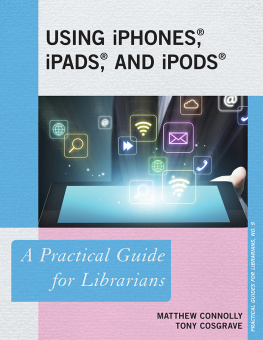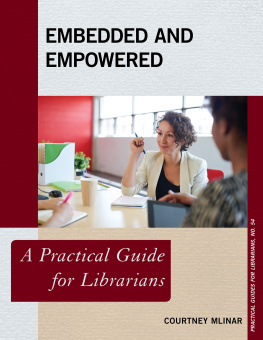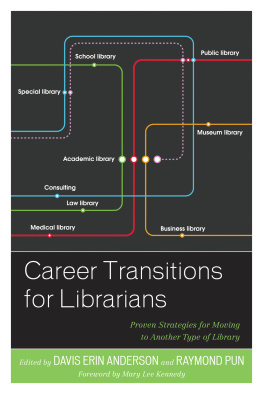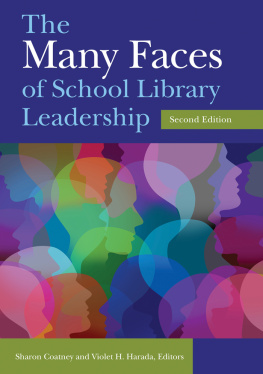Acknowledgments
First, I thank Our Creator for giving us all things great and small, for my life and my family. A very special thank you to Dr. E. J. Josey, my mentor and friend, for his guidance and encouragement throughout my career; thank you to E. J. and the ancestors who gave us the Black Caucus of the American Library Association, the platform for my growth, activism, and passion for black librarianship. Thank you to Martin Dillon, Andrew Yoder, and the Scarecrow Press family for accepting our proposal to produce this edition of The Black Librarian in America. A special thanks to Akilah S. Nosakhere and Julius C. Jefferson, Jr., for accepting the challenge to coedit this work with me and for their cooperative spirit and teamwork as we made this journey together. A special thanks to all those who addressed some of the many challenges black librarians face in the 21st century in their essays that appear in this book. A very special thank you to Pam Goodes for the wonderful photograph of E. J. on the dedication page: this book would not have been complete without this photo. Finally, thank you to all who will read this book in hopes it will have the lasting power and historic relevance of the first two editions. To empyrean, for your inspiration and love.
Andrew P. Jackson (Sekou Molefi Baako)
I thank Andrew and Akilah for their commitment, determination, vision, and support. It was truly a pleasure to work with you both. I would also like to thank my friend and mentor E. P. Boyd.
Julius C. Jefferson, Jr.
It has been a pleasure working on this project with Andrew P. Jackson and Julius C. Jefferson, Jr., to produce this new edition of Dr. Josey's series, The Black Librarian in America. It has been an enlightening experience full of professional challenge and growth. Thanks for allowing me to work on this project with you.
I also thank my former supervisor, mentor and friend, Mrs. Lucelia Flood Partridge for suggesting that I go see Dr. Lorene Brown, dean of the Atlanta University School of Library and Information Studies, about applying for library school back in 1986. That day changed my life and I thank you for it.
Akilah Shukura Nosakhere
Epilogue

Searching for Spring
Julius C. Jefferson, Jr.
It's winter
Winter in America
And an 't nobody fighting
Cause nobody knows what to say
Save your soul, lord knows
From Winter in America1
I n 2011, we said goodbye to poet and self-proclaimed bluesologist Gil Scott-Heron. Gil was one of America's most prolific, insightful social critics. Scott-Heron's metaphorical analysis of the state of black America was, in 1975, timely and now 37 years later, prophetic. In 2012, in the minds of many black librarians, it is still Winter in America.
This essay is a brief review of the themes first identified by Dr. E. J. Josey and his black librarian colleagues in the seminal volume The Black librarian in America, and its 1994 update The Black librarian Revisited. Collectively, these volumes documented the issues and experiences of black librarians in America from the 1950s to the 1990s. This current edition is the latest collection of essays to capture the black librarian experience.
In the first two volumes of Black librarians in America the dominant issue was race. The 25 essays in volume one, referred to in this epilogue as Genesis,1 revolved around themes of racial pride, identity, and social and professional activism, juxtaposed against efforts to confront, cope with, and overcome obstacles of racism, discrimination, and exclusion. As Josey noted, he
... became a better librarian not by working only in the library and classroom, but more importantly, by being part and parcel of the swiftly moving social currents that were going on around me in my community. I believed that in this way I obtained a more informed, disciplined and stringent understanding of what libraries could do for people.3
Josey was referring to being politically active for social change in America. He directly confronted racism and understood that the issues of inequality that affected black Americans were just as prevalent in the library profession. Unequal and disparate treatment could and has adversely affected the health, psyche, and economic stability of black librarians.
The essence of Genesis is an examination of black Americans struggle to be accepted and respected as professional librarians, despite a climate of entrenched white privilege in America. Josey and his contributors were librarians of the "Greatest Generation,"4 a generation of professionals who pushed for inclusion and acceptance at the dawn of the modern civil rights movement and who made significant strides in the progress against racial and social injustice during the 20th century. Josey emphatically and clearly notes that his involvement in civil rights became a catalyst for his fight for equality in the library profession. In turn, many barriers were broken. Genesis was also about "finding our place as black librarians." In another commentary about the state of blacks, Dr. Robert Wedg-worth documented the state of black professional inequality by examining black participation in and appointment to the American Library Association (ALA) leadership ranks. Dr. Wedgworth noted,
There were 405 members of the Association who served on the various standing committees between July 1960 and January 1970. Of the 405 members serving, 374 represent appointments made during the decade. Only five of the 374 went to Black librarians.5
Not only did black librarians feel discrimination on the jobs but in the professional association, which presented other impediments to professional advancement.
Shortly before the publication of Genesis, Josey wrote about "terrorism of blacks in the workplace,"6 and the lack of blacks in leadership positions in the profession. Blacks became targets of professional defamation whose ramifications included economic and reputational impacts. Josey states:
No black librarian holds the directorship of a major library in this country. There are a number of very able black librarians who have the qualifications and the experience who should have been chosen library directors long ago. To illustrate the point of racism which prevents the employment of black librarians: two and a half years ago, this writer received a letter from an administrator of a major university library asking for suggestions of names of black librarians that he might employ, because the university was faced with an accusation that it had not complied with Title VII of the Civil Rights Act. A letter was sent containing the names of several librarians who headed predominantly Negro college libraries, three of whom had doctorates. My correspondent replied that he was anxious to employ recent library school graduates and not persons with considerable experience. In short, he wanted to employ the black librarian as the assistant to the third assistant. There was no concern or interest in employing the black bibliophile even in a middle management position.7
At that time, the climate for promoting qualified black librarians at best may be described as cold as winter in America.
The next volume, The Black Librarian Revisited, documented the experiences of black librarians from 19701990. Revisited included 30 essays and 19 new contributors; the themes of this volume echoed the sentiments of the first volume. Revisited documented the black librarians struggle to be recognized as professionals and their efforts to deal with subtle and covert racism.
During this period, on the heels of the 1950s and 1960s civil rights victories, there was evidence of both advancement and retrenchment in the struggle against racism, and the fight for full enfranchisement across all institutions and professions. Through persistence and preparation and amid the setbacks during the 1970s and the Reagan era, black librarians continued to break down barriers in the profession. In 1976, the ALA elected its first black president, Clara Stanton Jones. Eight years later, Dr. E. J. Josey became the first black male to be elected president of the ALA.








